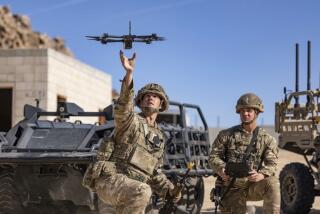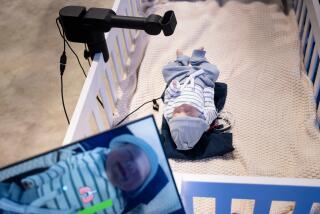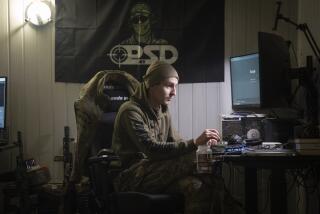Learning to defend against cyber warfare
Kyle Osborn could be called the Jack Bauer of the virtual age. He’s defending American interests from a potentially devastating attack. He’s doing so hunched over a laptop, armed with peanut butter and jelly and a jug of iced tea.
He is a cyber warrior.
“The bad guys always have a head start,” he said. “The good guys always have to be reactive.”
But he’s trying to change that. He is a 20-year-old who said he dropped out of college after two years with a year’s worth of credit, but he has made a name — and a living — for himself as a good guy for hire, working for a Santa Clara-based cyber defense company. For business and government trying to defend against espionage or a crippling attack, he’s on the front lines.
A virtual attack in an increasingly online world has become as serious a threat as a physical assault. The Pentagon said recently that computer sabotage by another country could be considered an act of war.
Both government and business have encountered the dangers that hackers can pose after a series of attacks, including one that hit Sony, potentially compromising the data of millions of video game users, and another that touched the CIA, when a group of hackers claimed responsibility for knocking the intelligence agency’s website offline.
Combating this requires a new kind of fighter.
“We need cyber warriors who are just as good as they are,” said Dan Manson, a professor of computer information systems at Cal Poly Pomona. “And to be a cyber warrior, you have to know what the bad guys do.”
On a recent morning, dozens of potential warriors, including Osborn, had gathered in a drab and hushed conference room at Cal Poly Pomona for the final day of the Cyber Challenge Camp, which Manson helped organize.
They were a varied group — a few had graduated from high school only a few weeks before, another had been working for years as a lawyer but decided to change paths. Participants were invited based on their performance at competitions nationwide held by the U.S. Cyber Challenge, an organization that’s looking to fill the nation’s shortage of cyber-savvy workers.
The participants spent a week learning the ins and outs of cyber defense. They learned how to protect a weak system, as well as how to break into one. They were taught hackers’ tricks and ethics for operating in cyberspace.
The common thread that united such a disparate group, it seemed, was a constant hankering for a good challenge. Many of them describe cyber defense as a never-ending puzzle. They become enthralled with the rapidly evolving showdown between the good guys and the bad.
On the last day of the camp, they put to use everything they’d learned for a virtual game of capture the flag. Instead of pushing their way to the center of a fortress to claim their prize, they had to do it digitally, hacking their way to the deepest part of a computer system to leave their mark.
There were a few hiccups getting started. Organizers had trouble getting the system operating (one could joke: How may hackers does it take to get a server running?). And a few of the participants lagged because they had to update software on their computers.
But Team Rocket took off. Members tapped away furiously at their keyboards, entering in the series of commands that, to the layman’s eye, looked like digital gibberish.
“So much going on!” Johnny Yu, the de facto leader of Team Rocket, said with a sigh. “It’s hard to manage.”
He kept plugging away, but after a while looked up at the scoreboard projected on a screen giving a real-time tally. Team Rocket had more than 10,000 points; some of the other teams were still stuck at zero.
“We’re, like, totally pwning,” said Yu, 26, using a techie term for owning or dominating an opponent and pronounced “powning.” Yu recently received an MBA with a focus on computer information systems.
As the day wore on — the competition lasted about four hours — he started to worry about losing his lead.
“We’re up by 800%!” said teammate Edward Wang, 18, who recently graduated from Mission San Jose High School in the Bay Area city of Fremont.
“People are catching up,” Yu snapped back. “Let’s work, come on! We’ll celebrate after.”
He was worried because rumors were trickling from across the room that Osborn, the wunderkind, had stockpiled all sorts of points, and was just waiting to submit them to judges in the final minutes of the competition.
But at the competition’s close, Team Rocket had 24,175 points, leaving the others in their dust. They had won the war. Or, in other words, totally pwned.
More to Read
Start your day right
Sign up for Essential California for news, features and recommendations from the L.A. Times and beyond in your inbox six days a week.
You may occasionally receive promotional content from the Los Angeles Times.





